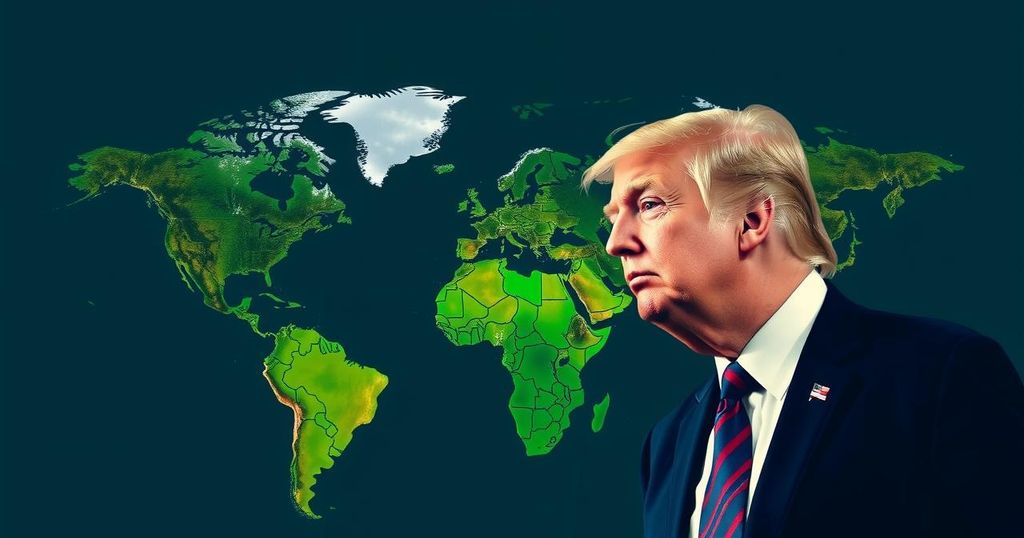COP29: Urgency of Global Climate Action at Risk under Trump’s Policies

COP29 in Baku is overshadowed by the anticipated U.S. withdrawal from climate discussions under Trump. Experts warn this neglect could worsen the global climate crisis, while Azerbaijan’s fossil fuel expansion raises ethical concerns over hosting the summit. The article discusses the implications of Trump’s policies on international climate cooperation, emphasizing the need for U.S. commitment to the Paris Agreement to effectively combat climate change.
World leaders, negotiators, lobbyists, and NGOs have convened in Baku, Azerbaijan, for COP29. This annual conference brings together representatives from around 200 countries committed to tackling climate change through negotiations under the UNFCCC framework established in 1992. However, the upcoming summit is overshadowed by the anticipated withdrawal of the United States from climate discussions under the Trump administration, threatening collective action against escalating climate crises such as severe floods, wildfires, and storms.
President-elect Donald Trump’s policies are perceived to prioritize the interests of polluting nations, dismissing the dire consequences of climate change on vulnerable communities. Experts warn that such a stance not only exhibits irresponsibility but also poses a grave risk to lives and livelihoods globally. COP29, scheduled from November 11 to 22, is contextualized as the “finance COP,” where nations aim to set a new climate finance goal, essential for long-term global commitment.
Significantly, as representatives look toward submitting stronger climate commitments (Nationally Determined Contributions) in anticipation of COP30 next year in Brazil, the participation of numerous world leaders is uncertain. Criticism has been aimed at the UN’s decision to host the conference in Baku, given Azerbaijan’s plans to expand gas production amidst ongoing regional tensions and a deteriorating human rights record. Countries and NGOs express concerns that this may be a strategy for Azerbaijan to enhance investments in its national oil and gas sector under the guise of climate dialogue.
Amidst this backdrop, Trump’s expected return to the White House raises alarm for a second U.S. withdrawal from the Paris Climate Agreement, undermining international efforts against climate change. Under his previous administration, the withdrawal in 2020 was justified by Trump as an unfair economic burden on the U.S., yet it tangibly damaged America’s role in global climate governance. The international community largely favors proactive engagement in global climate initiatives, recognizing that collaborative efforts are crucial in addressing the looming threat of global warming.
The Paris Agreement encourages world leaders to work together to limit global temperature rise to below 1.5°C. Trump’s potential departure from the agreement signifies a retreat from global responsibility, reducing the chances of significant greenhouse gas reductions. While the objective of COP is to highlight the urgency of emission reductions, Trump’s disinterest threatens to erode the importance of these negotiations.
The United States should reinforce its commitment to the Paris Agreement and fully engage in COP summits. This approach would enable the U.S. to maintain its stature as a global leader, fostering international cooperation for substantial emissions reductions. Without proactive participation, COP29 risks becoming futile, reinforcing skepticism about America’s commitment while exacerbating the global climate crisis.
The Conference of the Parties (COP) is a pivotal event in the global response to climate change, adhering to the framework set by the UNFCCC. As climate impacts become increasingly severe, the role of the United States as a significant global player is crucial. The upcoming COP29 in Baku is framed against contentious national and international backdrops, with geopolitical and humanitarian issues intertwined with climate policy, particularly under the prospective governance of the Trump administration.
In conclusion, COP29 faces significant challenges with the expected U.S. withdrawal from the Paris Agreement under Trump, complicating global efforts against climate change. Azerbaijan’s hosting of the conference amidst its fossil fuel aspirations further raises concerns about authenticity in climate dialogue. Active and collaborative participation in COP meetings remains essential for addressing the climate crisis effectively, and the United States must reclaim its leadership role in international climate efforts to foster global cooperation and meaningful change.
Original Source: www.counterpunch.org






